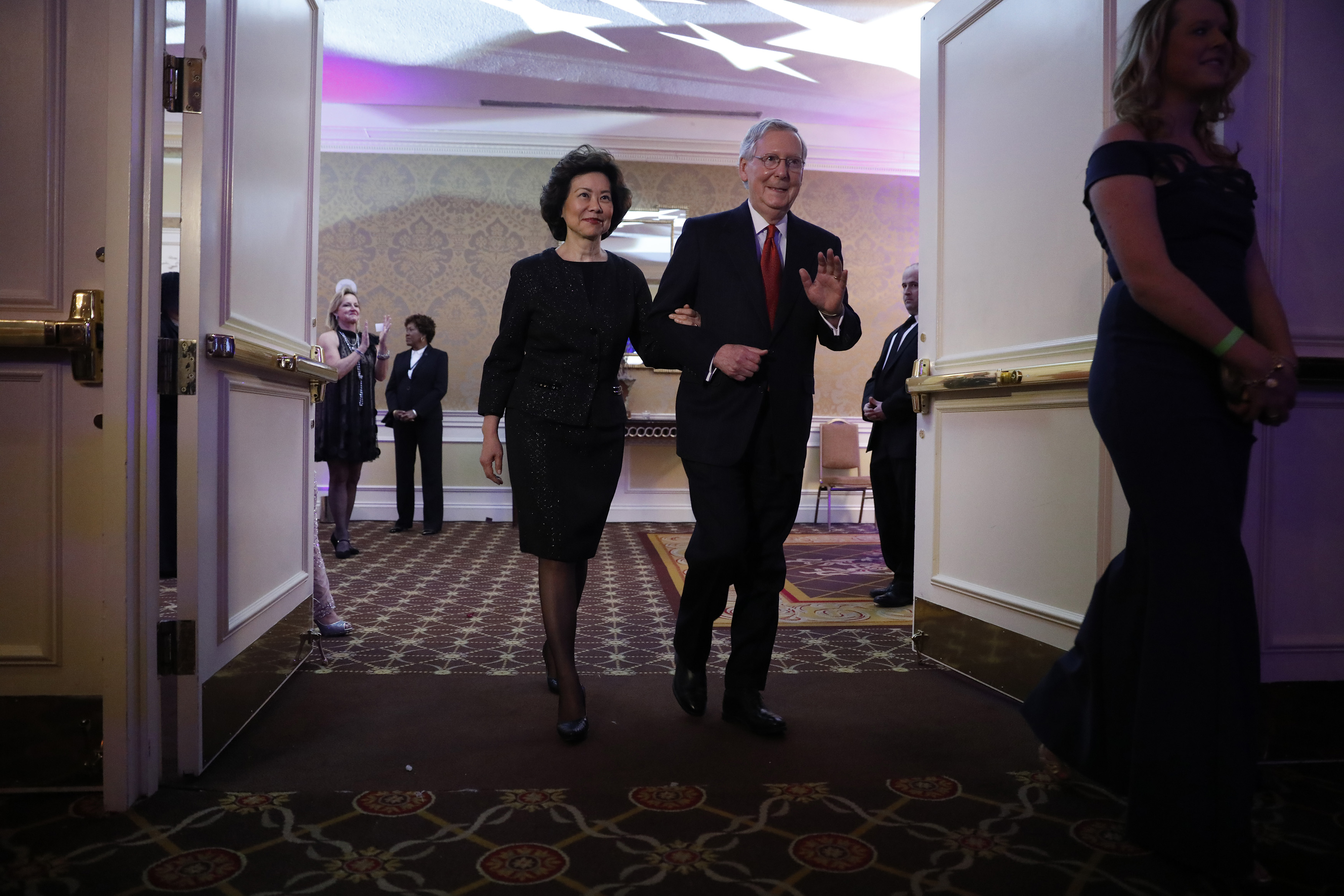Mitch McConnell lost some of his money-funneling power when Congress banned earmarks. Then his wife became a Cabinet secretary.


A free daily email with the biggest news stories of the day – and the best features from TheWeek.com
You are now subscribed
Your newsletter sign-up was successful
Senate Majority Leader Mitch McConnell (R-Ky.) touts his ability to steer federal money to his home state. For example, after the city of Owensboro named a plaza for him in 2003, McConnell steered $40 million to the city in 2005, and Owensboro's support helped him survive a close 2008 election. That kind of patronage became harder after congressional Republicans banned earmarks — or "pork" — in 2011, but not impossible. Last year, Owensboro won an $11.5 million Transportation Department grant on its third try, with some help from McConnell's wife, Transportation Secretary Elaine Chao, Politico reports, citing emails obtained though a public-records request.
Chao appointed a top aide in 2017 as special liaison to help McConnell "and local Kentucky officials on grants with special significance for McConnell," Politico reports, "paving the way for grants totaling at least $78 million for favored projects as McConnell prepared to campaign for re-election." The aide, Todd Inman, lived in Owensboro from 1993 to 2017, worked on McConnell's 2008 and 2014 campaigns, and is now Chao's chief of staff. His intercession for Kentucky is "a privilege other states did not enjoy," Politico notes.
The Transportation Department insists "no state receives special treatment" and Owensboro won the grants through an open, competitive process. But McConnell and local officials publicly tout the key role McConnell, Chao, and Inman played in steering federal transportation grants to Owensboro, and a former career official involved in the grant review process told Politico that after the professional staff hand grant recommendations in to a Cabinet secretary's office, politics often determine the outcome, regardless of party.
The Week
Escape your echo chamber. Get the facts behind the news, plus analysis from multiple perspectives.

Sign up for The Week's Free Newsletters
From our morning news briefing to a weekly Good News Newsletter, get the best of The Week delivered directly to your inbox.
From our morning news briefing to a weekly Good News Newsletter, get the best of The Week delivered directly to your inbox.
"Where a Cabinet secretary is doing things that are going to help her husband get re-elected, that starts to rise to the level of feeling more like corruption to the average American," John Hudak, a Brookings Institution expert on political influence on grant-making, tells Politico. "I do think there are people who will see that as sort of 'swamp behavior,'" even if it isn't illegal. Read more at Politico.
A free daily email with the biggest news stories of the day – and the best features from TheWeek.com
Peter has worked as a news and culture writer and editor at The Week since the site's launch in 2008. He covers politics, world affairs, religion and cultural currents. His journalism career began as a copy editor at a financial newswire and has included editorial positions at The New York Times Magazine, Facts on File, and Oregon State University.
-
 How the FCC’s ‘equal time’ rule works
How the FCC’s ‘equal time’ rule worksIn the Spotlight The law is at the heart of the Colbert-CBS conflict
-
 What is the endgame in the DHS shutdown?
What is the endgame in the DHS shutdown?Today’s Big Question Democrats want to rein in ICE’s immigration crackdown
-
 ‘Poor time management isn’t just an inconvenience’
‘Poor time management isn’t just an inconvenience’Instant Opinion Opinion, comment and editorials of the day
-
 Witkoff and Kushner tackle Ukraine, Iran in Geneva
Witkoff and Kushner tackle Ukraine, Iran in GenevaSpeed Read Steve Witkoff and Jared Kushner held negotiations aimed at securing a nuclear deal with Iran and an end to Russia’s war in Ukraine
-
 Pentagon spokesperson forced out as DHS’s resigns
Pentagon spokesperson forced out as DHS’s resignsSpeed Read Senior military adviser Col. David Butler was fired by Pete Hegseth and Homeland Security spokesperson Tricia McLaughlin is resigning
-
 Judge orders Washington slavery exhibit restored
Judge orders Washington slavery exhibit restoredSpeed Read The Trump administration took down displays about slavery at the President’s House Site in Philadelphia
-
 Hyatt chair joins growing list of Epstein files losers
Hyatt chair joins growing list of Epstein files losersSpeed Read Thomas Pritzker stepped down as executive chair of the Hyatt Hotels Corporation over his ties with Jeffrey Epstein and Ghislaine Maxwell
-
 Judge blocks Hegseth from punishing Kelly over video
Judge blocks Hegseth from punishing Kelly over videoSpeed Read Defense Secretary Pete Hegseth pushed for the senator to be demoted over a video in which he reminds military officials they should refuse illegal orders
-
 Trump’s EPA kills legal basis for federal climate policy
Trump’s EPA kills legal basis for federal climate policySpeed Read The government’s authority to regulate several planet-warming pollutants has been repealed
-
 House votes to end Trump’s Canada tariffs
House votes to end Trump’s Canada tariffsSpeed Read Six Republicans joined with Democrats to repeal the president’s tariffs
-
 Bondi, Democrats clash over Epstein in hearing
Bondi, Democrats clash over Epstein in hearingSpeed Read Attorney General Pam Bondi ignored survivors of convicted sex offender Jeffrey Epstein and demanded that Democrats apologize to Trump
